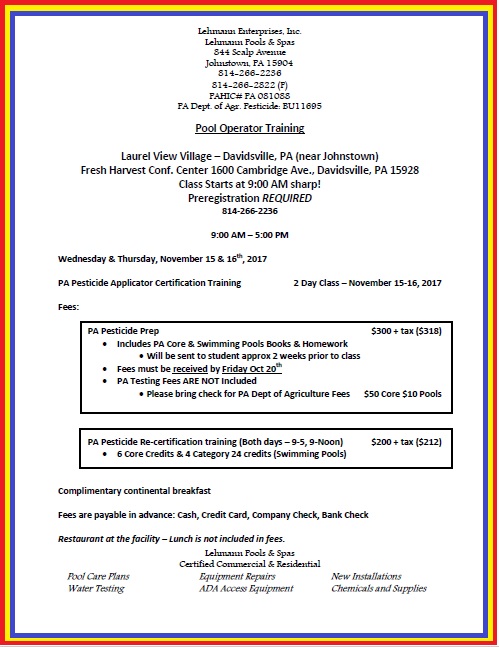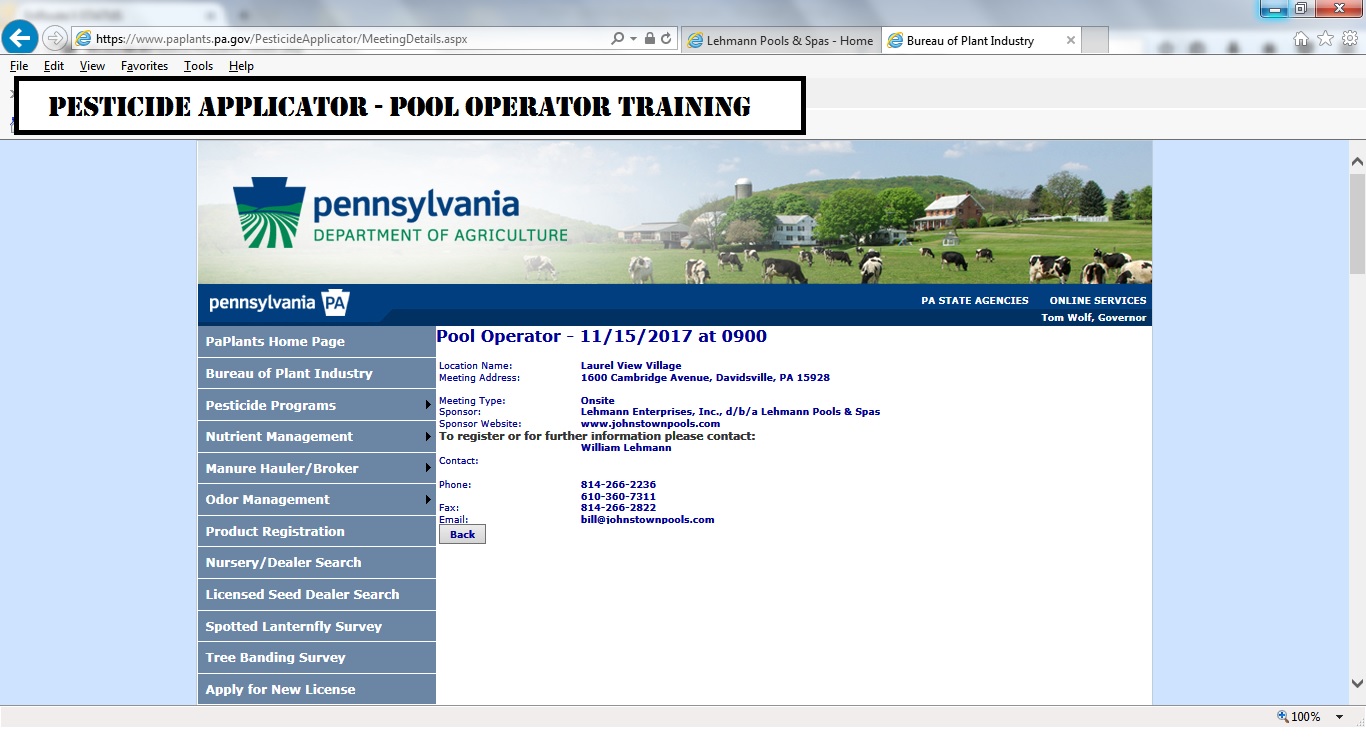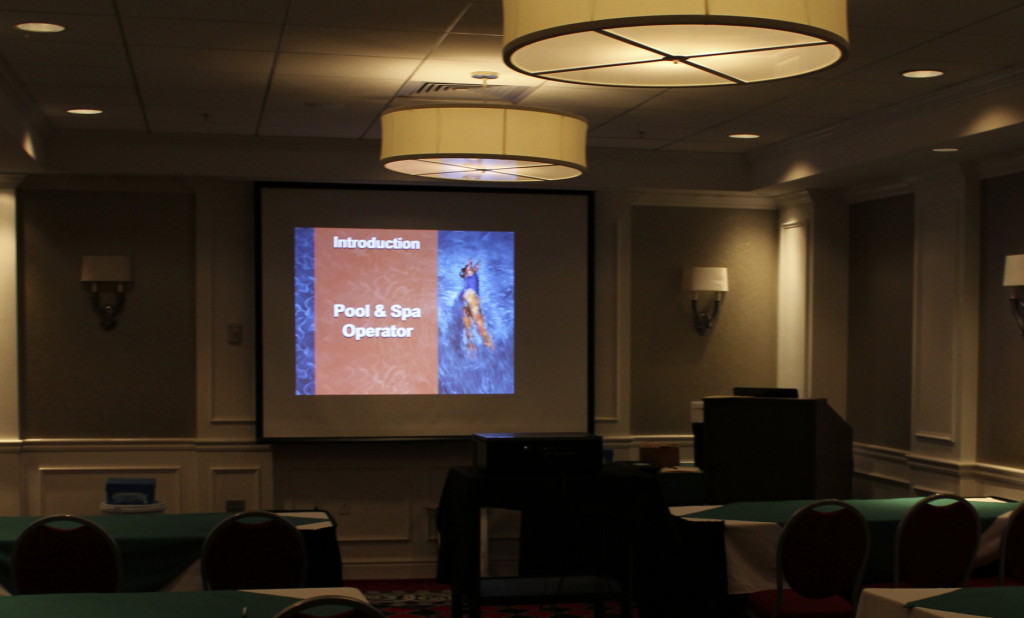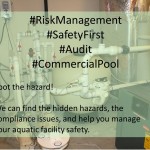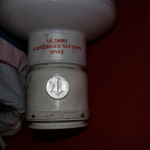PA Pesticide training for Aquatic Facility Operators
Risk Management
Lehmann Pools & Spas has training available to make sure the your facility operators have the knowledge to properly manage your water facility. Plus, we have the products and services to make managing your facility cost effective. Click on The Picture!
Institutional knowledge is information that is contained within the memories of people within an organization. Much is acquired through years of experiential learning; repetition of tasks, sometimes casual observation of others performing the tasks, “rule(s) of thumb” passed on from others. Indeed, many times we seem to value experience over “book learning.” We like our institutional knowledge.
And, there’s significant internal momentum to value institutional knowledge. The possessor of the knowledge likely finds it empowering. They know something others don’t. “If anybody needs to know, they’ll have to come to me.” If you know something that needs to be passed on to a new hire, especially if it’s technical, chances are your boss will ask you to “show the newbie.” Job security! Plus, it gives you bargaining power with your boss.
Oftentimes, your boss likes institutional knowledge, too. Instant delegation! He or she doesn’t have to spend time training the “newb.” They can get credit for a trained employee, but don’t have to do the leg-work.
The problem is, institutional knowledge is – well – a problem. Minor variations in verbal story-telling can profoundly affect the information retained by the new employee. And, the point of training is to affect behavior. What an employee does at the point of action is why we have employees. If they do it right – great! But, what if they do it wrong? “Well, Bob showed me that…” How can your organization have accountability like that?
There are 2 big problems with institutional knowledge:
- It’s often wrong. In many cases it’s little more than hearsay. Without a source document and a prescribed process to transmit information, it is very easy for a tidbit to become miss-stated. A hotel swimming pool volume of 47, 484 gallons will very often get rounded. But, which way did whomever round it? And, by how much? Then, without a reference, somebody takes the rounded number, challenges it and a new number becomes cast into the body of institutional knowledge. So, after 20 years, what’s right?
- There is no continuity. If the possessor leaves, where does the knowledge go? “I heard Jane say that we should push this button once a week.” For what purpose? Why? The tale gets told in a hodgepodge fashion. Some stuff may be retained. But much may be lost to posterity.
The only way to fight misinformation and to preserve continuity is with formal written documentation and training. One of the many services provided by Lehmann Pools & Spas is facility operator training. As instructors, our goal is to help you properly manage your facility, not just keep the Chlorine and pH adjusted. We can teach you how to develop a Risk Management System for your public aquatic facility.
We are big proponents of the National Swimming Pool Foundation’s (NSPF®) Certified Pool Operator (CPO®) program. We believe the CPO® program is more thorough and comprehensive educational than many other training curricula. Taught correctly, it is better at providing in-depth instruction. It is certainly beyond many programs in the marketplace who only seem concerned with meeting the regulatory requirements of pool operators – for instance those concerned with being certified pesticide applicators.
A well-taught program such as the NSPF® CPO® course well-equips the facility operator to effectively manage their facility. An added benefit of the CPO® program is the knowledge that the National Swimming Pool Foundation provides a comprehensive list of resources to effectively manage aquatic facilities. As NSPF® instructors, we can assist your facility in leveraging those programs to ensure your people have the quality training they need.
Not only will you be using authoritative sources for your training – real knowledge backed by science – but you’ll learn ways to document your information for future use and continuity. By understanding the importance of written, reviewed sources you’ll be fighting the 2 prevalent problems with institutional knowledge – correctness and continuity.
Join the Fight!
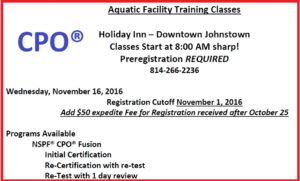
A safety audit can help you manage the risk of operating your commercial or public pool. We service quite a number of hotel, school, and public pools and find a surprising number of equipment and installation errors. Even “experienced” and “professional” builders and service people are making incorrect choices in their equipment specs. And, if they spec the right equipment, we find quite a number of installation errors.
- Non-compliant sanitizers
- Improper feeder installations – voiding NSF® certification
- Non-compliant drain covers – VGB violations
- Non-ADA compliance
- Modifications to pump and filtration systems without verification of VGB compliance
- Non-NSF® equipment
- Improper bonding
- Installation errors – non-compliance with manufacturer specs
The list goes on and on. And, we are by no means “big guys!” So if this is what we see, then there must be tons of violations.
And, it falls back on facility owners and their liability coverage providers.
Your Risk Management solution for your aquatic facility? A Safety Audit.
Lehmann Pools & Spas is certified by the NSPF® to conduct Facility Audits. Protect yourself. And, more importantly – protect your customers and clients.
814-266-2236 —– Read more on our Facebook pages or on other pages on this site.

